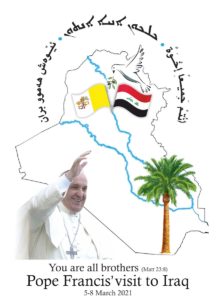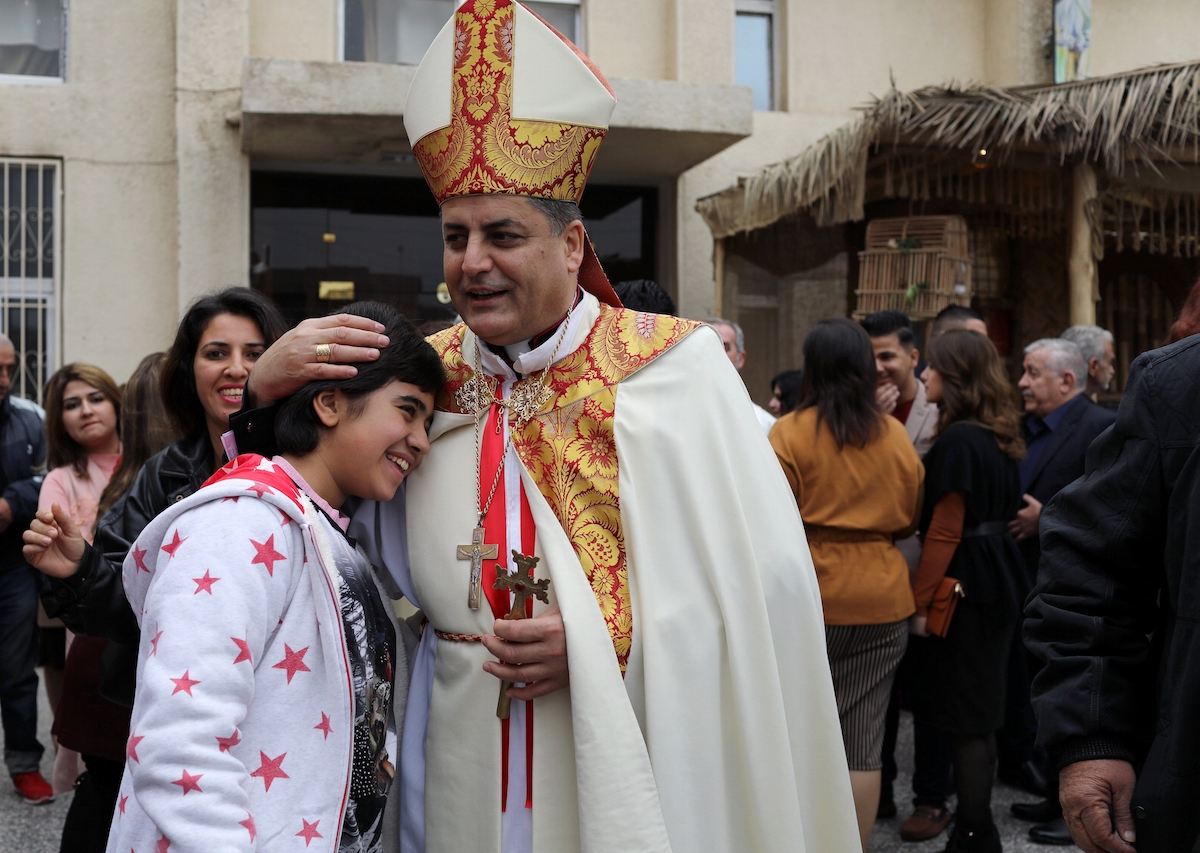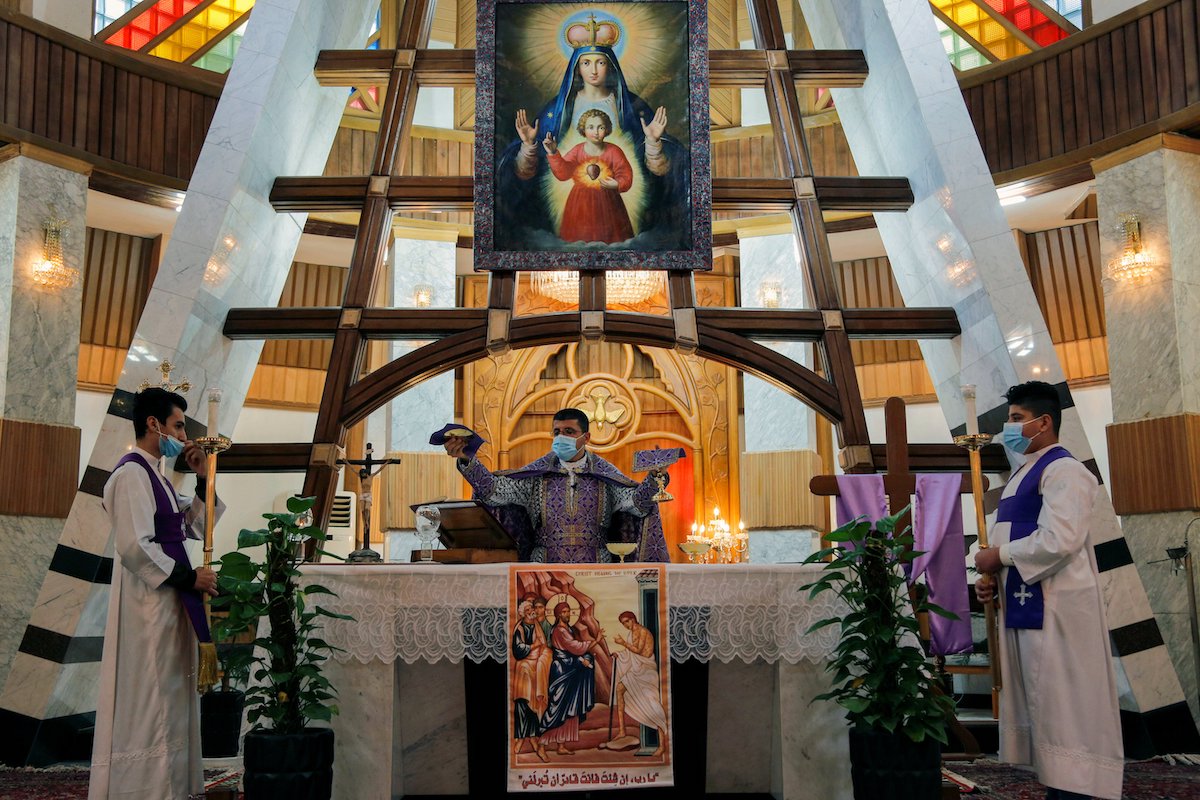

The 1,200 Chaldean Catholic families who live in Arizona are thousands of miles from the land of their birth.
On March 5, their hearts will turn toward their native Iraq.
 That day, Pope Francis will arrive in Baghdad, the capital of the Middle Eastern nation that has been torn by war, violence and religious persecution for decades. It marks the first time a pope has ever travelled to the land of Abraham, Isaac and Jonah.
That day, Pope Francis will arrive in Baghdad, the capital of the Middle Eastern nation that has been torn by war, violence and religious persecution for decades. It marks the first time a pope has ever travelled to the land of Abraham, Isaac and Jonah.
Appropriately, the visit takes place during Lent, or Soma in modern Aramaic, the language of the ancient Christian community. The modern city of Mosul, built on the Nineveh plain, is the city where Jonah preached repentance and the king sat in sackcloth and ashes and called for a fast.
Auxiliary Bishop Basel Yaldo of Baghdad said the visit of Pope Francis is significant in that it will encourage people to work together to achieve peace and will also raise awareness about the presence of Christians in Iraq.
“The pope’s visit will guarantee visibility to Christians by giving great significance and relevance to their presence in this part of the world and their suffering throughout history,” Bishop Yaldo told The Catholic Sun.
“We actually hope to see the outcome of this visit change Iraqis to be an open-minded nation, especially by restoring the spirit of youth and living happily together, building their country and securing a better future for the next generation.”

Maida Shabo fled Iraq after the first Gulf War and now makes her home in Gilbert with her husband Basil and their three children. She still stays in touch with family back home, especially a cousin who is a priest and who will take part in the papal Mass.
“The whole country is excited. The Christians over there — they have so much faith and to them, it’s like Jesus is coming to visit. It’s not right but that’s how they feel,” Maida said. “They have been through so much and this visit is just like God’s answer to them.”
Raad Delly lives in Scottsdale and has been in the U.S. since 1980. His cousin, the late Chaldean Patriarch Emanuel Delly, visited Arizona and met with Bishop Thomas J. Olmsted of the Diocese of Phoenix in 2013.
“It’s a great thing that the pope is visiting Iraq. We are hopeful for peace because he is going to meeting with the leader of Islam, Al Sistani, which is a good thing. We are hoping for a message of forgiveness and reconciliation.”
Like Maida Shabo, Raad also hopes that the visit will raise awareness about the presence of Christianity in Iraq.
“When people find out I am from Iraq, they say, ‘Oh, you’re Muslim.’ I say, ‘No, I’m Christian.’ They say, ‘There are Christians in Iraq?’”
“I have so many people asking me, ‘When did you convert?’” Maida chuckles. “I say, ‘I can’t tell you, because my ancestors were some of the first Christians. So there was no conversion there unless you are talking about pagans into Christianity.’”
The Christians of Iraq trace their origins to the ministry of St. Thomas the Apostle who traveled to the region in the first century. Then, as now, Christians have been beleaguered.
“Some people are worried,” Maida says. “The country is not stable, so that’s an issue. I hope everything will go easy and smooth and that nothing happens.”
Fr. Ray Sarkees, pastor of Mar Abraham Chaldean Catholic Church in Scottsdale, said Pope Francis will bring a key message to the people of Iraq:
“The pope has a message for all Iraqis. And especially for the Christians living in Iraq and that region … it’s a message of hope that although we are living in a bad economic and security situation in the country, still there is hope that things will be changed for the better.”
Beyond that, Fr. Sarkees said, Pope Francis will bring a message of reconciliation aimed at “the different parties that are ruling inside the country — to have some peace and reconciliation between them and show that they are brothers and sisters, that they are first of all human beings and also all citizens of that country whether they are Christians or Muslims or Kurdish or Yazidis.”
The Islamic State of Iraq and the Levant, ISIS, overran the Nineveh plain in August 2014, forcing tens of thousands of Christians and Yazidis to flee. Scores were killed or kidnapped. A deadly 2010 massacre at Our Lady of Deliverance Catholic Church in Baghdad led to the death of 58 people, including two priests. Fr. Sarkees knew both.
“Both who died there, they were my friends. I knew them from the seminary,” Fr. Sarkees said. “They were martyred, they were killed and a lot of people attending the Mass were killed. But still, God will bring from this tragic time something good.”

Pope Francis will meet with Grand Ayatollah Sayyid Ali Al-Husaymi Al-Sistani in Najaf March 6 and then travel to Nassirya for an interreligious meeting at the Plain of Ur where he is expected to promote dialogue and coexistence among all parties, Bishop Yaldo said.
“When the visit was confirmed officially, the majority of Muslims in Iraq were excited, the same as Christians. The meeting between Pope Francis and the Grand Ayatollah Ali al-Sistani in Najaf will be historical and we expect to impact on solidarity and coexistence,” Bishop Yaldo said.
Pope Francis will also travel to Erbil in northern Iraq. Bishop Felix Shabi, who once led the Chaldean Catholic Vicariate of Arizona and who was installed as Bishop of Zakho in northern Iraq last June, will be on hand for the historic papal visit.





